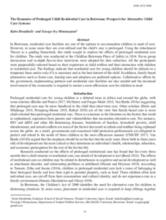Abstract
In Botswana, residential care facilities are one of the options to accommodate children in need of care. However, in some cases they are over-utilised and the child’s stay is prolonged. Using the Attachment Theory as a guiding framework, this study sought to explore the effects of prolonged residential care for children. The study was conducted at the Childline Botswana Place of Safety in 2014. Focus group discussions and in-depth face-to-face interviews were adopted for data collection. All the participants were purposefully selected based on their experience in child welfare and their interaction with children in residential care. The findings indicate that residential care for young children should be utilised on a temporary basis and/or only if it is necessary and in the best interest of the child. In addition, family-based alternatives such as foster care, kinship care and adoption are preferred options. Collaborative efforts by the government, implementing partners and residential care facilities are also needed and the increased involvement of the community is required to ensure a more efficacious care for children in need.

